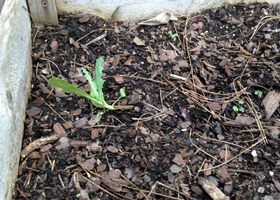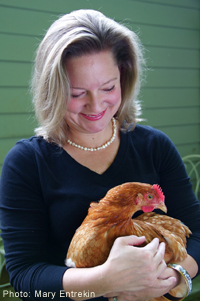It has been five years since I first asked my husband, “Why don’t we just grow our own food?” and we set out to farm our sunless quarter-acre in urban Nashville. After a half-decade of composting, weeding, and watering, I can safely declare the experiment in self-sustainability a success. But not in the way I had hoped.
If measured on a scale—not from one to ten, but an actual scale—the fruits of my labor could be tallied in ounces, not pounds. There was that handful of blueberries we harvested one year. And that sublime ear of corn the next. There has been the occasional arugula salad and the intermittent tomato, but for the most part there has been drought, excessive shade, blight, rot, and cussing. Thank God for mint, which perennially pushes through parched soil and into iced bourbon with enough fortitude to make us forget our farming heartache, at least for a cocktail hour or two.
 Each morning I inspect the garden beds with hope—that this will be the spring cilantro doesn’t bolt and squash doesn’t shrivel, that this will be the year I source more food from my yard than from a big-box store. But Nature returns like a hangover. Too much shade. Too little acid. Frostbite. Fungus. Aphids. Weeds. By breakfast, I am like an addict grasping for aspirin and hair of the dog in the form of store-bought fruit—slathered in wax, shrink-wrapped in plastic, and steeped in the stench of all the oil it takes to transport a McIntosh from Maine to Music City.
Each morning I inspect the garden beds with hope—that this will be the spring cilantro doesn’t bolt and squash doesn’t shrivel, that this will be the year I source more food from my yard than from a big-box store. But Nature returns like a hangover. Too much shade. Too little acid. Frostbite. Fungus. Aphids. Weeds. By breakfast, I am like an addict grasping for aspirin and hair of the dog in the form of store-bought fruit—slathered in wax, shrink-wrapped in plastic, and steeped in the stench of all the oil it takes to transport a McIntosh from Maine to Music City.
I mentally draft a note to my hero, Michael Pollan, which I will never send. After all, his Omnivore’s Dilemma got me started hoeing this row. (If I still named my backyard hens, I’d name one for him. But we don’t name hens anymore, because, as it turns out, urban raccoons eat urban hens with the same gusto that urban slugs devour urban kale.)
Five years in, my original question mocks me. “Why don’t we just grow our own food?” Because it’s hard as hell.
In an imperfect—nay, absurd and bloated—analogy, I liken my quest for urban agricultural self-sufficiency to C.S. Lewis’s scholarly exploration of atheism and myth, which led the author straight back to orthodox theology and renewed devotion. With a similar (though more begrudging) conviction, I have re-embraced the industrial food chain after five years of—let’s be honest—farming failure.
.jpg) Don’t misunderstand me: I do my best to eat local and support regional farmers. In my children’s eyes, our CSA farmer is Demeter herself. But a homegrown January in Middle Tennessee means frisée with a side of kale, if you’re lucky. No avocados. Let her who is without guacamole at a Super Bowl party cast the first stone at Big Ag. I’m not there yet.
Don’t misunderstand me: I do my best to eat local and support regional farmers. In my children’s eyes, our CSA farmer is Demeter herself. But a homegrown January in Middle Tennessee means frisée with a side of kale, if you’re lucky. No avocados. Let her who is without guacamole at a Super Bowl party cast the first stone at Big Ag. I’m not there yet.
Still, hope springs eternal, as does spring. And once again I am in the garden, trying to coax berries and mizzuna from the earth before the maple canopy blankets the ground in shadow and temperatures rise to 109 degrees. It is an unwinnable battle.
Or is it?
While I try to fight back the hydra of a neighbor’s invasive trumpet vine, I hear my children squabbling in the opposite corner of the yard. Tiny tempers flare, little voices rise. The eldest wields his seniority to claim the privilege of watering the newly planted cilantro. The youngest objects; he swears he is the best waterer. I stay silent, fixed on the eradication of Campsis radicans. The boys can quarrel all day if they want to, so long as they are outside, in the uncooperative but nourishing sun and shade of our vernal quarter-acre.
Some battles are worth waging—like the just war of independence from industrial agriculture, which is being fought a quarter-acre at a time. But I can’t staunch fraternal bickering any more than I can silence the trumpet vine, who taunts me with her beautiful resilience year after year. And when siblings rival over who can best nourish homegrown vegetables, I don’t even want to try.

Copyright (c) 2014 by Carrington Fox. All rights reserved. Carrington Fox is a food writer for the Nashville Scene. A native Nashvillian, she shares her sunless urban quarter-acre with her husband, David, three young sons, and four backyard hens.





